Prejudices Towards Refugees and Migrants: Media Disproven by the Situation on the Ground and Police
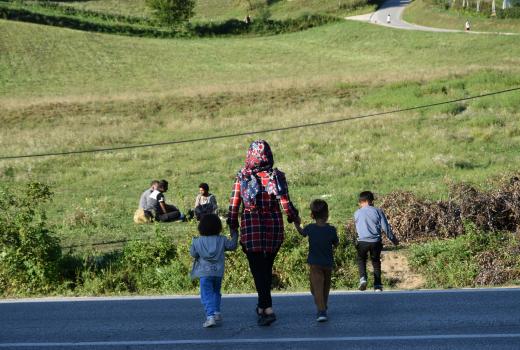
Prejudices Towards Refugees and Migrants: Media Disproven by the Situation on the Ground and Police
13/01/2021
Photo: Vanja Stokić
They burn, attack, beat, rob, rape. The citizens of BiH are in terror, fearing blood will be shed. Exclusively male, with modern clothes, extremists without papers.
These are the most common descriptions of people on the move in the BiH media. Ever since BiH became part of the Balkan route, its public has been poisoned with an abundance of fake news and disinformation on refugees and migrants with hardly any correspondence with the situation on the ground. The rare incidents that occur are abused to label an entire group of people, which ultimately results in more violence towards them.
Prejudice: Refugees and migrants are exclusively men
Reality: There are many women, children and minors in the camps and on the streets
Of the four currently active camps in the Krajina region (Borići and Lipa in Bihać, Sedra in Cazin and Miral in Velika Kladuša), two are reserved strictly for families. They house women with their husbands and children, as well as minors travelling alone. Indeed, refugees and migrants are predominantly men, but the number of women and children is not at all negligible. According to data of the International Organization for Migration (IOM), There are currently 569 people in these two camps, including women, children, their fathers and minors who are travelling unescorted. However, they are very rarely shown in the media for two reasons. Firstly, getting access to the camps to film them requires a permit. Permits were easily obtained before the pandemic, but it has not been possible as of March this year. Also, once a permit to enter the camps is obtained, each person you wish to film has to provide written approval as well. Some of the women do not wish to be exposed and the majority of them don’t speak English. Filming children is not allowed inside or outside the camps, as per the ethical standards of journalism.
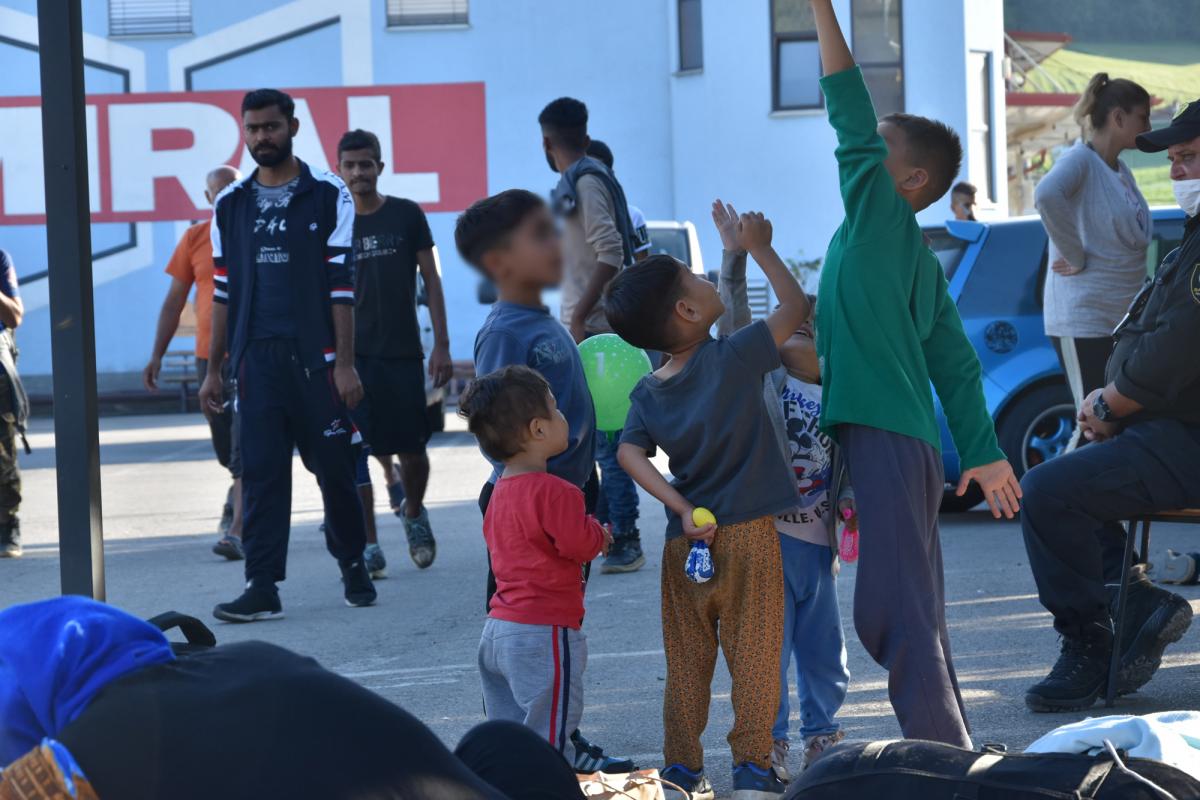
As a rule, women and children found on the streets are urgently placed in family camps. Still, many of them can be seen in the streets. In September this year, the area around the bus station in Banja Luka was flooded with families with children, as well as the area surrounding the Miral camp in Velika Kladuša. We encountered a father with three small children in the woods between Republika Srpska and the Federation of BiH, where the police had taken and left them in “no man’s land.”
“I just want to reach Europe and get adequate medical treatment for my son,” he said, pointing to the congenital anomaly on the boy’s head.
At the same time, the majority of the residents at checkpoint Velečevo near Ključ, which operates as part of the local Red Cross, are families with small children. The Facebook profile of the Red Cross regularly posts information on women and children residing at the checkpoint. When we visited them in late September, there were several families with small children and babies. All of them barely knew any English, which made all communication impossible.
In Tuzla, women and children are placed in a house rented by a few organisations solely for that purpose, to remove them from the streets immediately upon arrival. As for men who are travelling alone, most of them say that they are “paving the way” for families they left behind in their countries of origin. After they reach Europe, they will help them get there legally and start a new life.
Prejudice: They are not refugees, but illegal immigrants
Reality: There are many refugees, and no person can be illegal
According to data from the Service for Foreigner’s Affairs of Bosnia and Herzegovina, a total of 60,237 refugees and migrants entered BiH in the past two years. In terms of refugees fleeing war, they come from Afghanistan (8,792 people), Syria (5,290 people), Iraq (5,054 people), Libya (972 people) and Palestine (743 people).
“I left because it became too dangerous to live there. The Taliban came to my house one day and said I had to fight for them. My father said I have to leave because our village is in danger, flooded with the Taliban. My family is still there, my father is old and cannot travel. I have five brothers, two are in the national army, one is currently in Turkey, and two are very young. I started this journey with one of my brothers but he stayed in Turkey because we didn’t have enough money to travel together. We decided that I should come here and try to reach a European country, and then help him join me there,” explained a young man from Afghanistan whom we met in Tuzla mid-January.
People from Pakistan (19,559 people), Iran (5.008 people), Bangladesh (3,194 people), Morocco (2,953 people), Algeria (2,357 people), Egypt (1,064 people) and India (869 people) migrate for economic reasons, fear of human rights violations or out of fear for their lives and safety. Pakistan is an extremely poor country where a third of the population is below the poverty line. Human rights and freedoms are very limited, and according to Human Rights Watch, a whopping 20 million children do not attend school.
“There’s no work, no food,” the majority of Pakistanis say when asked why they left their home.
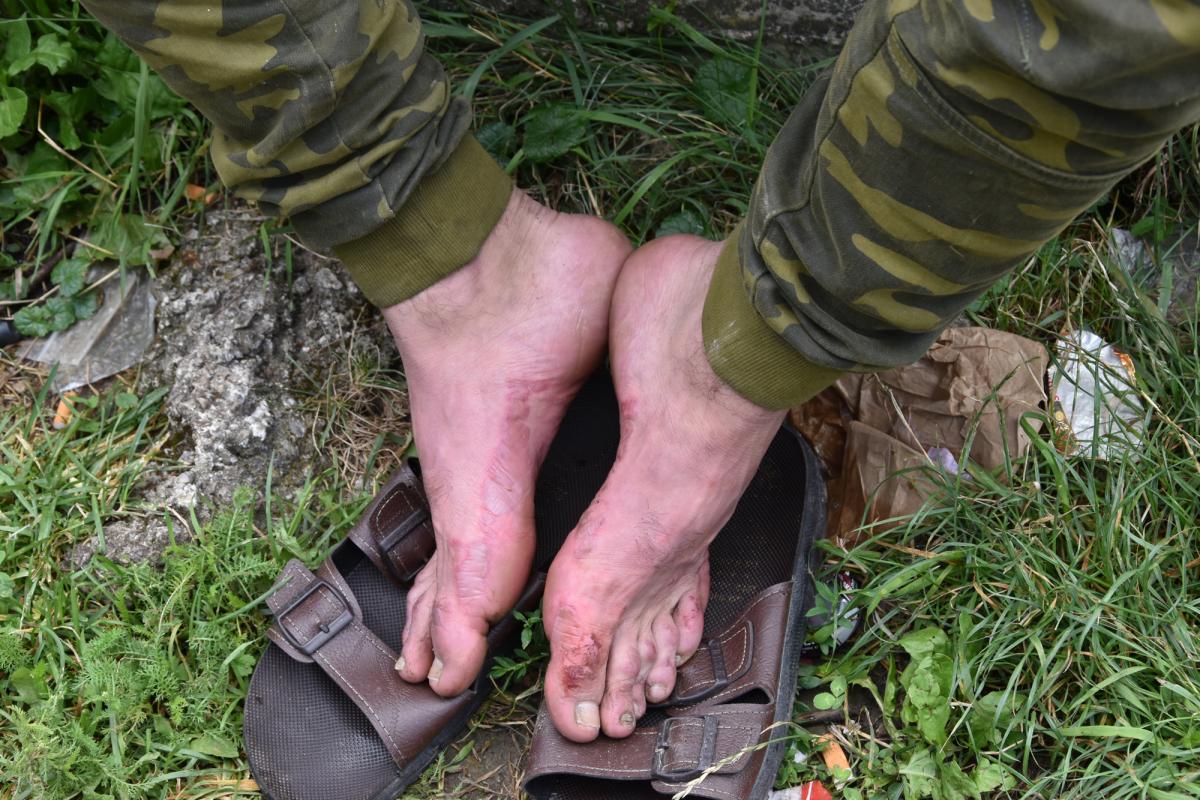
Prejudice: They have no papers and cannot be identified
Reality: Ask and they will show them to you
It is true that some migrants and refugees have no papers, but it is also true that the rest do. In July this year, two men showed us their passports in Velika Kladuša to persuade us that they are from Tunisia. In January this year, we met three other Tunisians at the train station in Banja Luka, who also had their passports with them. They told us that they came to Serbia legally for the New Year holidays, and then illegally crossed into Bosnia and Herzegovina.
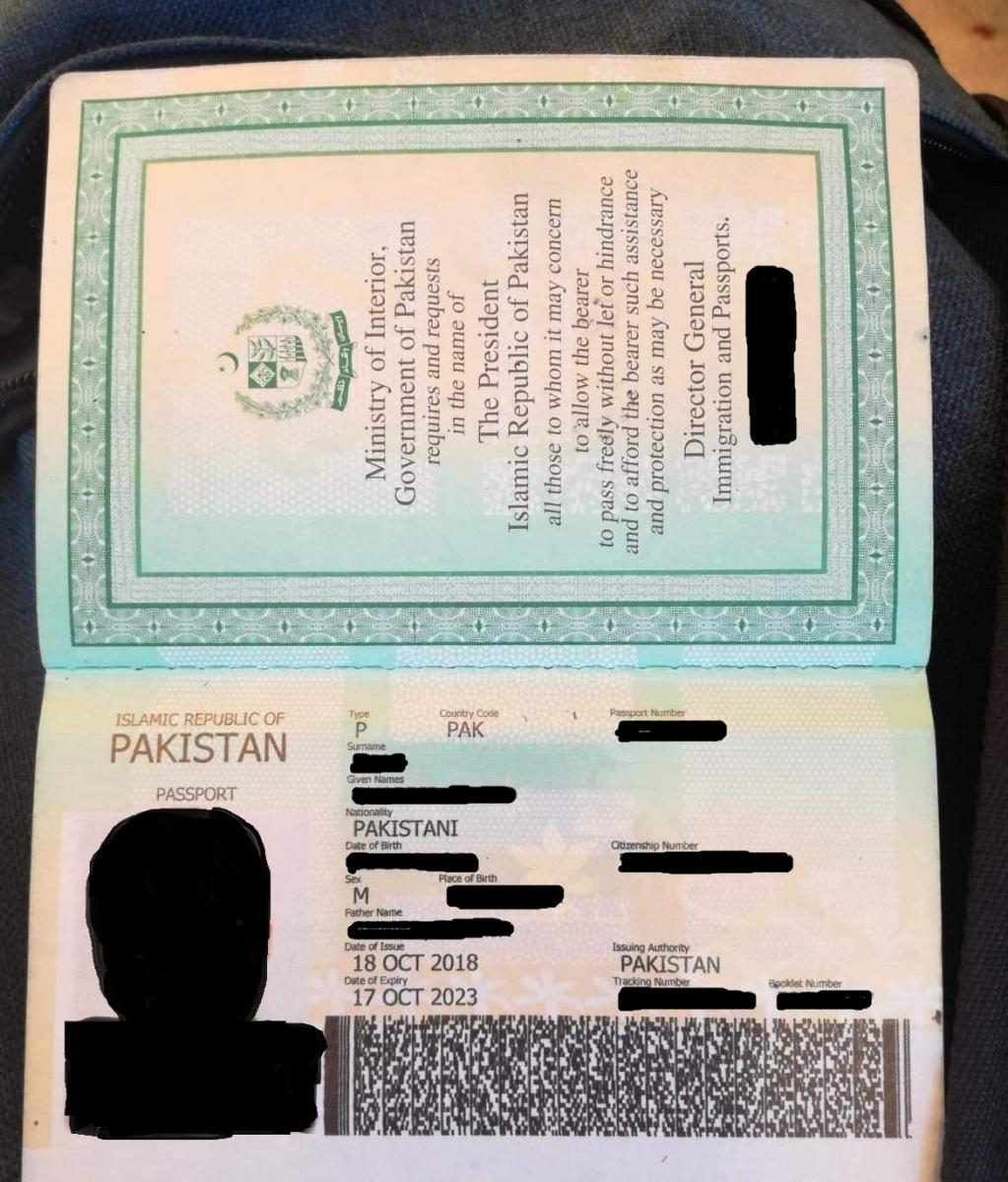
A man from Kashmir sent us a photograph of his passport, asking us to help him get asylum. A man from Morocco, after a few months in BiH, realised that he made a mistake and should never have gone on this journey. Thanks to the passport he carried with him all along, he had no problem getting back home. In Tuzla, a Moroccan journalist showed us his passport, press credentials and several other papers to prove his identity.
According to volunteers working on the ground, as well as people on the move themselves, refugees and migrants lose their papers in transport, they get stolen or even destroyed by the police. Dozens of refugees and migrants have told us that police officers in Croatia tore up or burned their passports.
“I can’t reach Italy legally with my passport, if I showed it at the border, they would take it away or burn it. I don’t have it with me, but I have a scan,” says Islam from Tunisia.
That identifying refugees and migrants is possible was demonstrated by the recent murder in Bihać, when two men were killed during a confrontation between two groups. After a few days, the killers were identified and located in Sarajevo.
Prejudice: They burn the houses in which they stay
Reality: The houses burned by accident or are set on fire by the local population
The houses occupied by refugees and migrants are either abandoned/devastated, or the owners don’t live there. Sometimes the owners allow them to stay there. If there is a fire, it is accidental in most cases because people on the move try to heat themselves with fire inside the house, which spirals out of control. Sometimes they fall asleep by the fire and end up injured as well, in addition to the house being ruined. Other times, the local population sets fire to houses occupied by migrants out of hatred for people on the move. This was the case recently in Vrnograč near Velika Kladuša, in a house which the owner allowed four migrants from Morocco and Algeria to use temporarily. Both migrants and locals confirm that local bullies came to the house for days, beating the people on the move and even drawing weapons on them. One night they came with a canister of petrol.
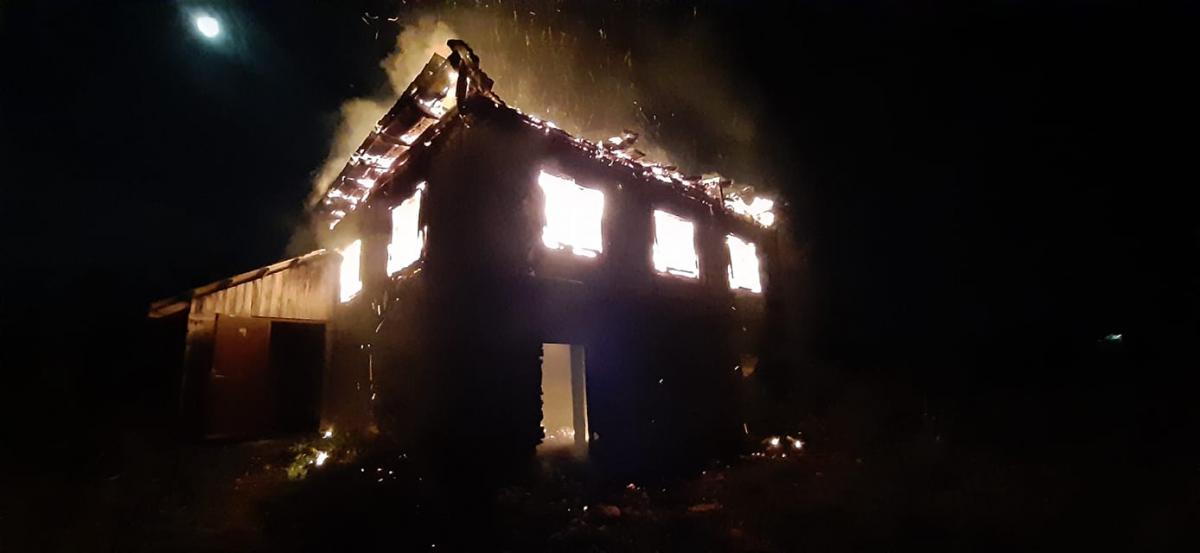
“It’s not good. They are violent towards us here; they even use stun guns. They burned a house with petrol, one where we slept,” said Amar from Morocco during our visit to Vrnograč in late September.
During the conversation, they showed us their bruises and knife wounds, which they claim were inflicted by these bullies. His story was also confirmed by the people of Vrnograč.
“They beat them so hard the other night, the whole village echoed with moans and screams. One night they shot at them. They drew weapons in broad daylight, outside the primary school, no less! They say they have to protect their children from the migrants, but I don’t know exactly what they’re protecting them from when it’s not the migrants making trouble here. It’s not safe for them here. They’ll kill them!”, they said, begging us not to publish their names or pictures.
The Una-Sana Canton police informed us that they registered the case, but that they have no information on the perpetrators. A similar event took place on 31st October in Polje near Velika Kladuša.
“The problem is that there are people who want to solve the migrant crisis at all cost. Last night, these ‘Bosnian bandidos’ beat four poor people so badly that bones were broken and burned their house and all their ‘equipment.’ So much for us,” said Šefik Sadiković, the firefighter who was the first to respond to the scene, the morning after the fire was extinguished.
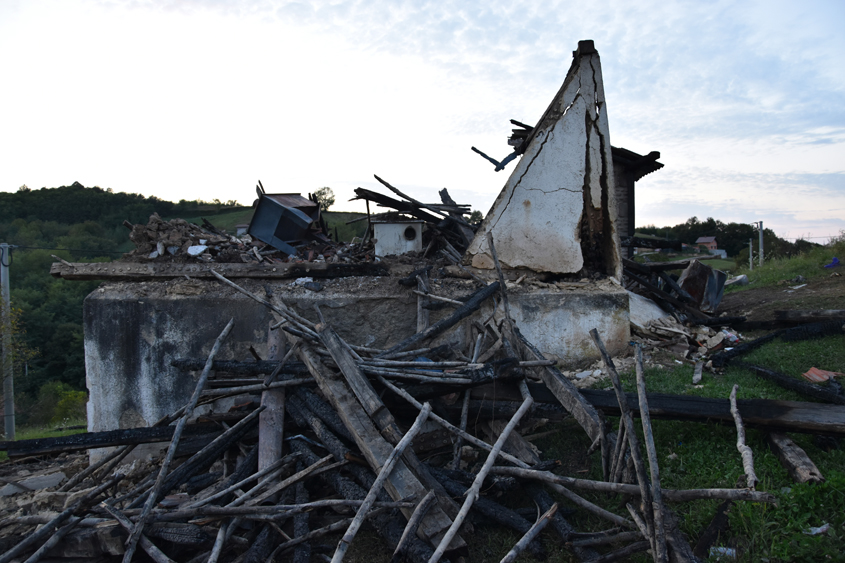
According to him, the house was abandoned and people on the move had been using it for the past two years.
“I called the ambulance and police because they were beaten and one of them couldn’t stand up,” he continued.
The Cazin.net news portal reported the incident, stating that the house was burned by migrants and that “it was to be expected.”
A video was recently shared on Facebook, made by a man from Krajina. The video shows him going into an unused house where he came across a few men on the move trying to keep warm by the fire. He then ordered them to stay inside the house while he tried to nail boards on the room window. Luckily, the men managed to escape very quickly.
In some cases, even the police deny media reports that refugees and migrants burned houses, which happened in the Krstače village near Bileća. The media often publish reports directly accusing people on the move of setting fires but offering no evidence of these claims, not even statements from the locals, firefighters or the police. It is common for the media to report that migrants are the culprits in the headline, whereas the article itself contains the information that the culprits are unknown.
Prejudice: They wear expensive clothes and have good phones
Reality: They have what they’re given in BiH
Migrants and refugees in BiH mostly have only what they get from the locals, non-governmental organisations and volunteers. They return to BiH from the “game” (illegal border crossing) with nothing and claim that their phones, money, sleeping bags, and even shoes are taken by the Croatian police. Sometimes they even return completely naked.
“There goes a group of them, completely naked! The poor things were beaten and everything was taken from them, even clothes, so they had to walk back like that through the woods of BiH. The locals then gave them what they could,” a young man from the Polje village near Velika Kladuša, the location of the Miral camp, told us in early October.
A phone is very important to all people on the move because it is the only way to communicate with their families, as well as the only way to travel through woods and across mountains (Google Maps). Facebook groups offering help to refugees and migrants in BiH occasionally post requests for phone donations to people on the move who have lost theirs.
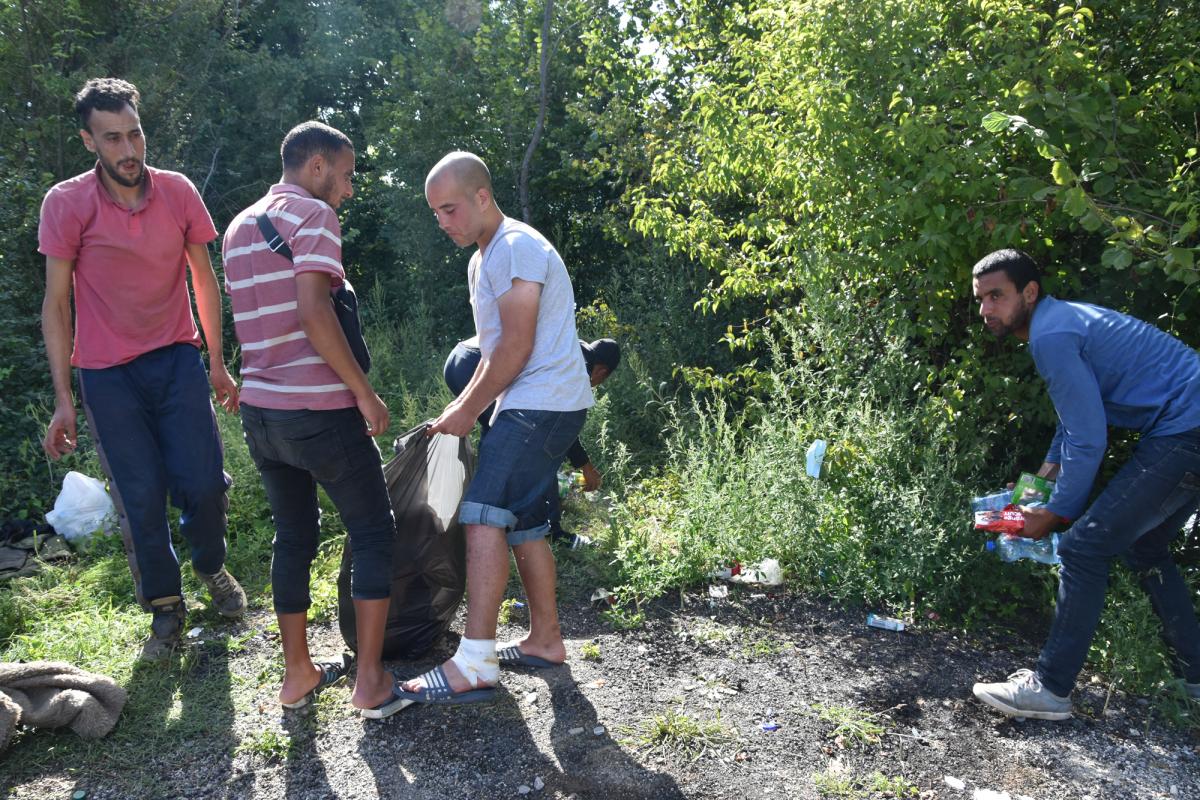
Prejudice: They leave trash behind
Reality: Significantly less than BiH citizens
It is true that places occupied by refugees and migrants have a lot of trash. It is also true that these places are very tidy if there are trash bins or dumpsters nearby. For instance, at the bus station in Tuzla, we witnessed its clean-up by refugees and migrants. In “no man’s land” between RS and FBiH, people on the move asked us if we had any trash bags with us so they could clean the space they occupied. There is no trash to be seen in the woods occupied by about 400 men from Bangladesh, except that in trash bags tied to trees.
At the same time, if we veer into suburban areas anywhere in BiH which aren’t frequented by people on the move, we can see furniture, household appliances and a lot of other waste dumped in rivers.
Prejudice: They are violent and terrorise the local population
Reality: The police refute the media
According to research carried out by the Raskrinkavanje.ba portal, people on the move have been the usual target of fake news and disinformation in the BiH media over the past 2.5 years. This group of people is most frequently depicted as violent and radical.
“The article that marked the ‘turning point’ in media reporting on migrants was published in May 2018 in the Dnevni Avaz newspaper and claimed, contrary to police reports, that ‘Migrants Pillage and Beat in the Centre of Sarajevo.’ From that moment on, the amount of disinformation on migrants and refugees started to rise. However, the real ‘expansion’ of disinformation happened after the majority of refugees and migrants were concentrated in the Una-Sana Canton, i.e., borderline areas which, in time, became increasingly difficult to exit in order to cross the border into Croatia. The disinformation narrative culminated in 2019 when, among other things, the Antimigrant portal entered the BiH online media scene. Its very name, as well as its content, clearly and openly delivered the message that its purpose was to incite hatred towards refugees and migrants. By then, similar content became widespread on social networks, where they are usually published on anonymous sites,” it is stated in the research.
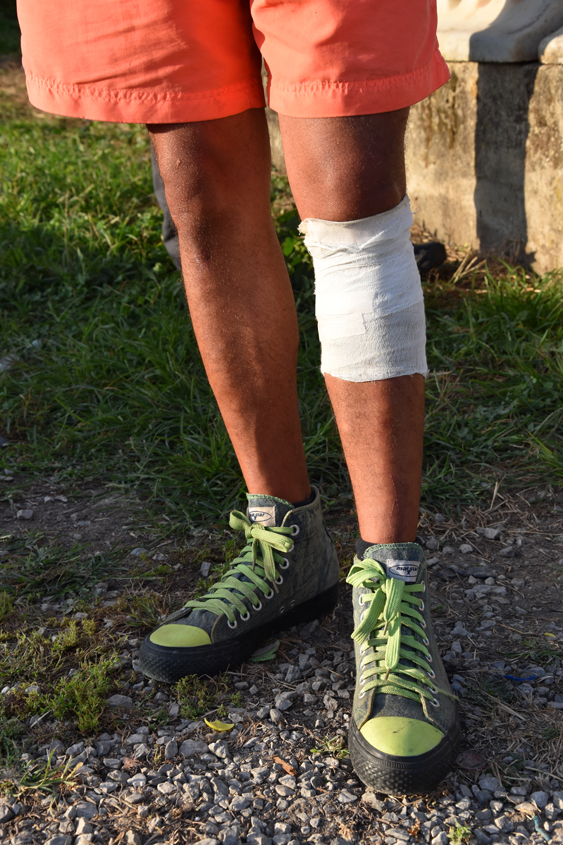
According to the Ministry of Internal Affairs of Una-Sana Canton, there were 1,693 criminal offences in the Canton in 2019, of which 205 were committed by people on the move. The majority of these offences – 165 – were robberies and break-ins, followed by infliction of bodily injuries and arson. In terms of serious crimes, there were four murders within the migrant population.
During 2018, out of 1,406 criminal offences committed in the USC, 77 are believed to have been committed by refugees and migrants. Half of them are thefts or burglaries. There were two registered cases of rape, one within the migrant population and one of a young woman. There were also three attempted murders and one murder, according to the USC MIA.
The Žurnal news portal published information confirming that the situation is similar in the Sarajevo Canton, based on data of the SC MIA. They reveal that, from January to September of this year, a total of 3,433 criminal offences were committed in the Sarajevo Canton, of which only 88 were committed by refugees and migrants. Among them are two murders, four attempted murders, five cases of severe and three of minor bodily injuries, as well as one case of an indecent act. The rest are mainly cases of theft and robbery.
Mujo Žalić lives near the Miral camp in Velika Kladuša. Not far from his house are several large squats in which people on the move reside. He emphasizes that he’s never had any trouble with them. If anything does happen, it’s usually little things, he says.
“Someone took some shoes or clothes from the line, the other day they took a towel. I told him not to do that, I’ll give it to him if he asks. He cried… He was ashamed of what he was doing, and I would have given it to him anyway. I can understand them, look at how they walk around in the rain,” said Žalić in early March of this year.
His neighbour thinks that the situation is generally very bad and that nobody, not the institutions or the NGO sector or the citizens, is prepared to receive these people in humane circumstances. He pointed out that one of the key issues is the inability to communicate because the majority of the local population do not speak English. He’s housed several men on the move in his home.
“People are having troubles, not everyone should be treated as a thief. At least I don’t think they are. I let them stay here for a while. I live alone and I’d feel bad having a spare room while they’re out in the rain. As a human being, I helped them out,” he says.
A few of his fellow citizens protested outside the Miral camp in early October, demanding it be closed and the people on the move deported. The citizens did not want to talk to the press. Those who agreed to speak off the record could not give a personal negative experience with refugees and migrants, but re-told events reported in the media or heard from other people. Only one woman said that refugees and migrants are stealing the wood outside her house, so she had to protect her property with a fence.
The hostility towards people on the move is further exacerbated by media headlines such as ”Migrants Sow Fear Among the People of Tuzla: Stealing Wallets and Following Young Women on the Streets”, “Migrants are the Greatest Threat”, “INCREASED NUMBER OF CRIMES Galić: Illegal Immigrants are Getting Increasingly Aggressive”, or “This Will Chill Your Blood – Migrants Raped 1,400 girls in the City of Rotherham”.
Allegations of migrants terrorising the local population were especially frequent in the media immediately before and after the Lipa camp was opened near Bihać. The SrpskaInfo portal published the sensationalist article “WIDESPREAD FEAR THAT BLOOD WILL BE SHED I Serbs Call Upon the Armed Forces of BiH to Defend Them From MIGRANTS.” The article lists statements accusing people on the move of violent behaviour and disturbing the citizens. The other side is only seemingly introduced, as in this case, migrants weren’t asked about the accusations at the heart of the article, but to comment on the camp food and living conditions. With this, they were robbed of the opportunity to comment on all the things of which they are publicly accused.
On his family’s estate in the Lipa village, we encountered Mirsad Đuzović who said that he came here on the weekends. He has a herd of sheep on the estate and a shepherd who takes care of them, his family house and auxiliary facilities. He sees no damage there.
“The migrants have been here since March and we’ve had absolutely no trouble with them. They entered a weekend home to sleep but did not damage it. Or set fire to it or robbed it. They didn’t miss a nail!” says Đuzović just a few hundred meters from the camp.
Nevertheless, the sensational headlines mostly produced without even visiting the ground and by copying information from other media outlets greatly influence the opinion-forming of the local population. This is the case with volunteers of the eTrafika.net portal, whose information on people on the move came exclusively from other media outlets which, again, copy fake news and disinformation from each other. Wanting to put their attitudes to the test and see the position of people on the move with their own eyes, they joined eTrafika journalists to visit a large number of camps and squats in BiH. After seeing the situation on the ground and gaining personal experience, all of them rejected their prejudices which came from the media in the first place.
Editor’s note: The article was amended on 27th November 2020 in the part about people on the move from Pakistan, Iran, Bangladesh, Morocco, Algeria, Egypt and India. The earlier version stated that these people emigrated for economic reasons, whereas the updated article states that it is due to “economic reasons, fear of human rights violations or out of fear for their lives and safety.”




